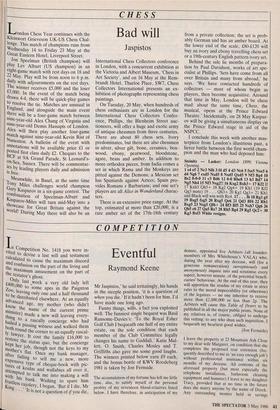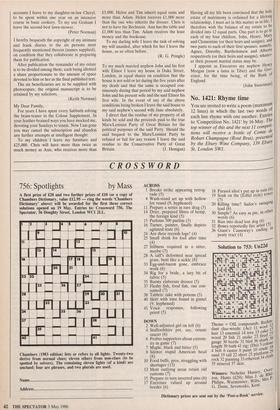COMPETITION
I a Competition No. 1418 you were in- vited to devise a last will and testament calculated to cause the maximum discord and confusion on the part of the living and the maximum amusement on the part of the testator's ghost. Only last week a very old lady left £400,000 to some apes in the Paignton Zoo, leaving only one and a half thousand to be distributed elsewhere. At an equally advanced age, my mother (who didn't know the name of the current prime minister) made a new will leaving every- thing to a rascally concierge who had hailed a passing witness and walked them both round the corner to an equally rascal- ly lawyer. It cost the family £16,000 to restore the status quo, but the concierge kept her job, though not the keys to my mother's flat. Once my bank manager, after failing to sell me a new, more expensive type of cheque-book with pic- tures of attempted koalas and wallabies all over it, mpted to talk me into making a will with his bank. Wishing to spare him fruitless cajolery, I began, 'But if I die, Mr King. . ."It is not a question of if you die,
Eventful
Raymond Keene
Mr Jaspistos,' he said irritatingly, his hands in the steeple position, 'it is a question of when you die.' If it hadn't been for him, I'd have made one long ago. Funny things, wills, a fact you exploited well. The funniest single bequest was Basil Ransome-Davies's: 'To the Royal Esher Golf Club I bequeath one half of my entire estate, on the sole condition that each member of the Club Committee legally changes his name to Gaddafi.' Katie Mal- lett, 0. Smith, Charles Mosley and T. Griffiths also gave me some good laughs. The winners printed below earn £9 each, and the bonus bottle of KWV Roodeberg 1981 is taken by Jon Fernside.
The accumulation of my fortune has left me little time, alas, to satisfy myself of the personal probity of my seventeen blood-relatives listed below. I have therefore, in anticipation of my
demise, appointed five Arbiters (all founder- members of Mrs Whitehouse's VALA) who, during the year after my decease, will (for a generous remuneration) surreptitiously and anonymously inquire into and scrutinise every aspect, however minute, of the potential benefi- ciaries' behaviour. At the end of this year, they will apportion the residue of my estate in strict ratio to the moral impeccability (or otherwise) of the legatees — no one inheritor to receive more than £2,000,000 or less than 2p. The Arbiters will cause this Table of Desert to be published in all the major public prints. None of my relatives is, of course, obliged to undergo this vetting: to any who shun such inquisition, I bequeath my heartiest good wishes.
(Jon Fernside) I leave the property at 23 Mountain Ash Close to my dear wife Margaret, on condition that she completes the proposed rear extension (fre- quently described to me as 'an easy enough job') without professional assistance within six months of my decease. All contents of the aforesaid property (but most especially the telephone installation, bathroom cleaning equipment and hamster) [leave to my daughter Tracy, provided that at no time in the future does she marry anyone by the name of Derek. Any outstanding monies held in savings accounts I leave to my daughter-in-law Cheryl, to be spent within one year on an intensive course in basic cookery. To my son Graham I leave the second-best lawn-mower.
(Peter Norman) I hereby bequeath the copyright of my intimate and frank diaries to the six persons most frequently mentioned therein (names supplied), on condition that they collaborate in preparing them for publication.
After publication the remainder of my estate is to be divided among them, each being allotted a share proportionate to the amount of space devoted to him or her in the final published text.
The six beneficiaries are to be supplied with photocopies; the original manuscript is to be retained by my solicitors.
(Keith Norman) My Dear Family, For years I have spent every Sabbath solving the brain-teaser in the Colour Supplement. In your feather-brained ways you have mocked me, devoting your Sundays to tennis. Now I am gone you may cancel the subscription and abandon any further attempts at intelligent thought.
To my children I leave my furniture and £25,000. Chris will have more than twice as much money as Ann, who receives more than £3,000. Helen and Tim inherit equal sums and more than Adam. Helen receives £1,000 more than the one who inherits the dresser. Chris is not to have the Bechstein. Ann has the table and £1,000 less than Tim. Adam receives the least money and the bookcase.
To my darling wife I leave the task of solving my will unaided, after which for her I leave the house, as so often before.
(R. G. Pringle) To my much married nephew John and his first wife Elinor I leave my house in Duke Street, London, in equal shares on condition that the house is not sold or let during the five years after my death and that the same is occupied con- tinuously during that period by my said nephew John and his present wife and the said Elinor his first wife. In the event of any of the above conditions being broken I leave the said house to my said nephew's second wife Jane absolutely.
I direct that the residue of my property of all kinds be sold and the proceeds paid to the true Marx/Leninist Party of Great Britain for the political purposes of the said Party. Should the said bequest to the Marx/Leninist Party be refused or fail for any reason I leave the said residue to the Conservative Party of Great Britain. (J. Henigan)
Having all my life been convinced that the holy estate of matrimony is ordained for a lifelong relationship, I must act in this matter as in life. I therefore wish the balance of my estate to be divided into 12 equal parts. One part is to go to each of my four children, John, Henry, Mary, and Clementine (or their heirs and assigns), and two parts to each of their first spouses, namely, Agnes, Dorothy, Bartholomew and Alberto respectively (or their heirs and assigns), whatev- er their present marital status may be.
I appoint as Executors my nephew Henry Morgan (now a lama in Tibet) and the Gov- ernor, for the time being, of the Bank of England. (John Sweetman)



















































 Previous page
Previous page